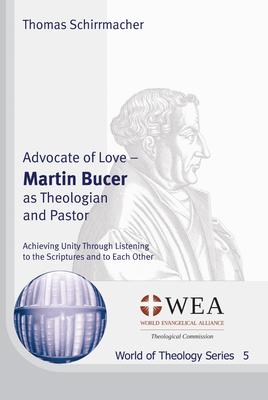Evangelicals comprise a movement that spans practically all denominations and even confessions worldwide. Now Evangelicals are found on both sides of the old ditch between established, mainline churches and free churches, between Reformed theology and more recent developments, and between traditional structures and all sorts of revivalist movements. That is reason enough to take the Reformer who already embodied, represented, and unified all of these trends in himself during the 16th century as a role model. Martin Bucer (1491-1551) was a leading illustration of the attempt to use Scripture to find what is common at a time when Christianity was beginning to experience the fragmentation we see today and to win back erring brothers in a friendly and sustainable manner. For a long time Bucer was the least known of the great Protestant Reformers. But in his lifetime he was as well-known as Luther and Calvin. He achieved this status without establishing a denomination or confession, but was forgotten in an age of separatism in Christianity which did not provide space for reformers who loved unity. Prof. Dr. theol. Dr. phil. Thomas Schirrmacher, PhD, ThD, DD, is professor of the sociology of religion at the State University of the West in Timisoara (Romania), Distinguished Professor of Global Ethics and International Development at William Carey University in Shillong (Meghalaya, India), as well as president and professor of ethics at Martin Bucer European Theological Seminary and Research Institutes with branches in Bonn, Berlin, Zurich, Innsbruck, Prague, Istanbul and Sao Paolo. Schirrmacher has held guest professorships and has given special lectures at universities on all continents. Schirrmacher is chair of the Theological Commission of the World Evangelical Alliance (WEA), director of the International Institute for Religious Freedom (Bonn, Cape Town, Colombo) and Ambassador for Human Rights of WEA; the WEA represents churches with 600 million members altogether. He also is a member of the board of the International Society for Human Rights. Schirrmacher regularly testifies in the German parliament and other parliaments in Europe, as well as in the EU in Brussels, the OSCE in Vienna and other international bodies. His has written 102 books; three of his newest books are Fundamentalism, Racism, and Human Trafficking. He has earned four doctorates, in missiology and ecumenical theology, in cultural anthropology, in ethics, and in sociology of religion, and received two honorary doctorates from the USA and India.
| FindBook |
有 1 項符合
Advocate of Love的圖書 |
 |
Advocate of Love 作者:Schirrmacher 出版社:Wipf & Stock Publishers 出版日期:2018-05-10 語言:英文 規格:平裝 / 96頁 / 22.61 x 14.99 x 1.02 cm / 普通級/ 初版 |
| 圖書館借閱 |
| 國家圖書館 | 全國圖書書目資訊網 | 國立公共資訊圖書館 | 電子書服務平台 | MetaCat 跨館整合查詢 |
| 臺北市立圖書館 | 新北市立圖書館 | 基隆市公共圖書館 | 桃園市立圖書館 | 新竹縣公共圖書館 |
| 苗栗縣立圖書館 | 臺中市立圖書館 | 彰化縣公共圖書館 | 南投縣文化局 | 雲林縣公共圖書館 |
| 嘉義縣圖書館 | 臺南市立圖書館 | 高雄市立圖書館 | 屏東縣公共圖書館 | 宜蘭縣公共圖書館 |
| 花蓮縣文化局 | 臺東縣文化處 |
|
|
內容簡介
作者簡介
Prof. Dr. theol. Dr. phil. Thomas Schirrmacher, PhD, ThD, DD, is professor of the sociology of religion at the State University of the West in Timisoara (Romania), Distinguished Professor of Global Ethics and International Development at William Carey University in Shillong (Meghalaya, India), as well as president and professor of ethics at Martin Bucer European Theological Seminary and Research Institutes with branches in Bonn, Berlin, Zurich, Innsbruck, Prague, Istanbul and Sao Paolo. Schirrmacher has held guest professorships and has given special lectures at universities on all continents.
Schirrmacher is chair of the Theological Commission of the World Evangelical Alliance (WEA), director of the International Institute for Religious Freedom (Bonn, Cape Town, Colombo) and Ambassador for Human Rights of WEA; the WEA represents churches with 600 million members altogether. He also is a member of the board of the International Society for Human Rights.
Schirrmacher regularly testifies in the German parliament and other parliaments in Europe, as well as in the EU in Brussels, the OSCE in Vienna and other international bodies. His has written 102 books; three of his newest books are Fundamentalism, Racism, and Human Trafficking. He has earned four doctorates, in missiology and ecumenical theology, in cultural anthropology, in ethics, and in sociology of religion, and received two honorary doctorates from the USA and India.
Mother of Invention: Mother Teresa and the Franciscan Servants of Jesus
Is EVOLUTION True?: Why Darwin’s Rejection of Intelligent Design no longer makes sense. Why Life really is a miracle in the true sense
Systematic Theology (Volume 3)
A System of Logic: Ratiocinative and Inductive, 7th Edition, Volume. II
The Syrian Christ
Christianity as Mystical Fact, and the Mysteries of Antiquity
Christmas Evans, the Preacher of Wild Wales; His country, his times, and his contemporaries
Bible Myths and their Parallels in other Religions; Being a Comparison of the Old and New Testament Myths and Miracles with those of the Heathen Natio
Dismantled: Abusive Church Culture and the Clergy Women Who Leave
|











